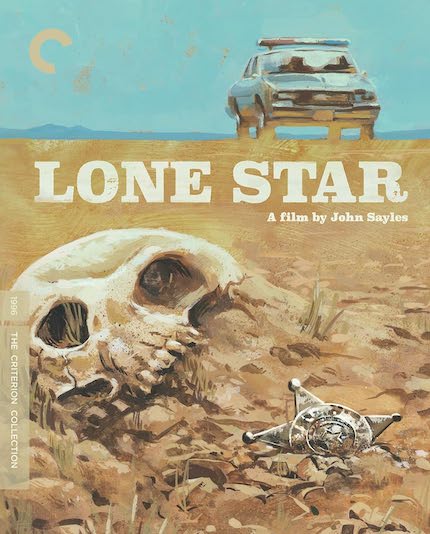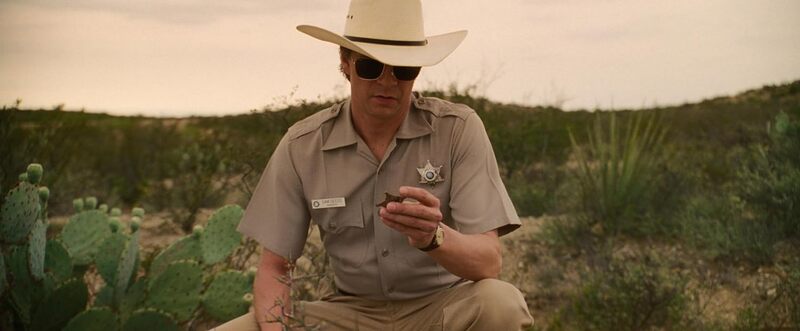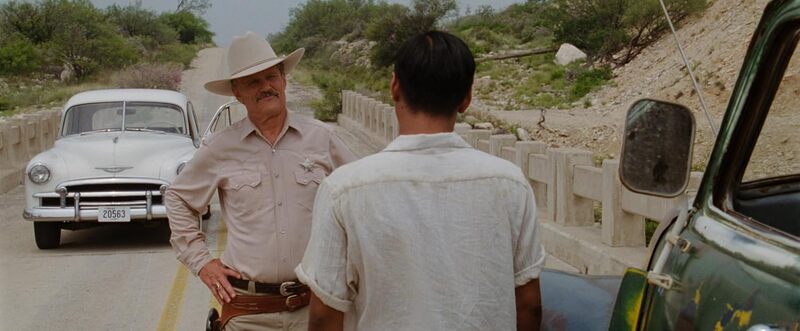LONE STAR 4K Review: John Sayles' Texas Tale Shines Bright with Criterion
Chris Cooper, Elizabeth Peña, Kris Kristofferson and Matthew McConaughey star in John Sayles' layered tale of injustice and reconciliation.

When a skeleton is found in the desert on the edge of Frontera, Texas, the sun is not scorching the sand and the area’s residents within inches of their lives.
Instead, it’s almost overcast, the sky a muted greyish blue... with some blood red. A more poetic fella may take note of, say, how its very subtlety evokes the American Civil War with that coloring. Lone Star isn’t a Civil War story, though. Its unearthed scars and resonant heartbreak have roots far older than that.
In an apropos way, this otherwise blah grey sky is reflecting the characters’ histories of internal feuding and divisiveness. You have to look closer, maybe a little longer, to gather that. You have to stop and think about it.
Kinda perfect for Lone Star. Kinda perfect, except that director John Sayles, the lifelong indie film great, wanted it the other way around.
In an interview on this Criterion release of the film, he tells of how he wanted the scorching, burning sun for these scenes. But, as his story dictates, there is little in life that we have any control over. That uncovered skeleton? It’s no less sunbaked and d-e-a-d. The question for Frontera sheriff Sam Deeds (Chris Cooper, perfection in his breakout role) is, who was it?
Actually, there are plenty more questions in this brilliant 135-minute tapestry of injustice and reconciliation than that. Far deeper ones, too. It doesn’t take a forensics expert to put two and two together to deduce that these are the bones of another Frontera sheriff, one Charlie Wade (portrayed in flashbacks by the iconic Kris Kristofferson). Wade wore the star decades prior, enforcing his own vile, racist brand of law and order at the barrel of his big black 7.5” barrel Colt New Frontier revolver- something, by all accounts, he was all too happy to threateningly whip out.
Today (well, 1996, when Sayles made and released Lone Star), Wade’s tin star has been devoured by corrosion and dirt. Again, apropos. But who, in the Wade’s vile history of raw hate, killed him and why? Considering the unflinching boldness with which Kristofferson embodies Wade’s evil…. egads, that list could run the length of the outsized state itself.
And how might our protagonist’s father, the late and beloved prior sheriff Buddy Deeds (an early part for a quickly budding Matthew McConaughey) have been involved? These are mysteries for Sam and Sam alone.
From that set-up by itself, one can accurately deduce that the title Lone Star has perhaps more angles than any six-pointed badge. Through a satisfyingly broad ensemble of characters, some of which are realized by the talented likes of Joe Morton, Míriam Colón, Clifton James [understated and a far, far distance from Sheriff J.W. Pepper of 007 fame], Frances McDormand, and Stephen Mendillo, and selectively doled out flashbacks, each arrived at via impressively innovative in-camera transitions, we come to see how the multi-ethnic Frontera treats and ignores its deep-seated generational scars. The town is a triumvirate of Black, Caucasian, and Mexican denizens, the latter group making up the vast majority of its populace, though wielding practically no authority. Cobwebs of tensions ensue.
From Lone Star’s vantage point, we can’t help but back up far enough to include our present moment. The way Sayles’ film (is this his masterpiece?) gets at U.S./Mexican border issues and the flagrant damage perpetrated by white supremacist nationalist legends, such as the 1836 showdown at the Alamo, reminds today’s viewers how horrendously little things have changed.
If anything, the milieu of “us versus them,” in all its valid permutations, has only gotten louder; the old rug it’s always been swept under forcibly pulled away, albeit by hatemongers and isolationists. With Lone Star, Sayles and company pulled that same rug away years ago. They did it in the name of a darn good story that promotes soul searching, reframing of ingrained myths, and straight-up humane decency. And goddammit, not enough people listen.
As is far too often the case, stories with important lessons for us to consider ultimately go unheeded. This is one of those stories. The state of Texas has always proclaimed its vast individualism and identity. But it’s also a part of the United States.
Those previous two sentences might as well be a gestalt test, as your reading will be greatly informed by your politics. No matter that, though, no viewer can overlook the achingly compelling tapestry of racially and politically diverse characters -- some cross paths in Lone Star, some do not -- and the issues they face.
Timely as ever, Lone Star proudly joins the Criterion Collection with a spirited 4K UHD + Blu-ray special edition. The image and sound are thoroughly absorbing, the 4K digital restoration having been supervised by director John Sayles and director of photography Stuart Dryburgh, and sporting an appropriate 2.0 surround DTS-HD master audio soundtrack. The two-disc package offers the movie two ways, on a 4K UHD disc presented in Dolby Vision HDR, and also on a Blu-ray disc which also contains the special features.
Criterion has taken its share of heat in physical media collector circles lately for easing off the number of bonuses their releases contain. While this is absolutely not the case across the board --for a very recent example, see the wealth of bonus features on the Criterion release of Guillermo del Toro’s Pinocchio-- Lone Star’s bonus menu may at a glance reinforce this criticism. There are only two items of real substance, though both are newly created for this release. Both are tremendously worthwhile.
The first, a new 38-minute in-person conversation between Sayles and filmmaker Gregory Nava (El Norte) about Lone Star, proves invaluable. Even as it approaches twice the length of most such Criterion supplements these days, the chat is not only never boring, but also perpetually engaging.
It is clear that Sayles, in his seasoned age, hasn’t dulled his advocacy of social justice nor his matter-of-fact love for the earlier schlocky side of his career, as he happily recalls being on the set of Joe Dante’s Piranha, which he also mentions he wrote. Sayles, like Lone Star itself, comes away as profound.
There is also a new 19-minute video interview with Lone Star’s cinematographer Stuart Dryburgh, who reflects on the unusual challenges of shooting the film in arid Texas, particularly as a new talent at the time. Besides that, there’s only the film’s original trailer, English subtitles for the deaf and hard of hearing, and the requisite published essay, this one by scholar Domino Renee Perez.
It may not look like a lot, but y’know, sometimes a little really is a lot. While it would’ve been ideal to hear from Chris Cooper or Matthew McConaughey about how this film bolstered their acting careers, this is far from an unsatisfactory serving.
As tremendously well received as Lone Star was in its day critically, it wasn’t received widely enough. It ought to be part of the conversation of Great Films of ‘90s whenever that topic arises. But it’s generally not. Perhaps this fine 4K/Blu-ray release by Criterion will help to shine a proper light.
Too young to grasp the vitality of the film, my 1996-era college-aged self generally dismissed John Sayles films (such as the labor-centric Matewan), what with their outward social messaging and Haskell Wexler involvement, as little more than manna for the NPR crowd. And perhaps, at times, they are indeed that.
At their best, though, they rise to far greater heights than mere real-world critique. Lone Star leads the pack, probably both in popularity and accomplishment. It’s not easy to do in the desert, but sail on, sail on, John Sayles.
For more information, visit the official Criterion site.
Lone Star
Director(s)
- John Sayles
Writer(s)
- John Sayles
Cast
- Chris Cooper
- Elizabeth Peña
- Stephen Mendillo









